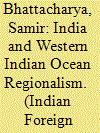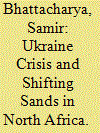|
|
|
Sort Order |
|
|
|
Items / Page
|
|
|
|
|
|
|
| Srl | Item |
| 1 |
ID:
192907


|
|
|
|
|
| Summary/Abstract |
With the world system moving from a bipolar to a multipolar structure,
and the world agenda shifting from narrow high-politics to lowpolitics, there is a need to critically examine the impact of emerging
countries on regionalism and the regional systems of the Global South.
Uplifted by its economic growth, India is exerting to play a more
active role beyond its immediate neighbourhood by developing critical
partnerships with regional and extra-regional players. As a result of
India’s expanding ties with the Vanilla Island countries, India has
recently been accepted as an observer in the Indian Ocean
Commission. While France has traditionally dominated this region
due to its shared history, China has also been increasingly asserting
its position here. Against the backdrop of Chinese presence continuing
to shore up as well as the mounting tension between the USA and
Iran over the Mozambique Channel, the competition between these
powers could spill over into the region and impact the peace, stability,
and ongoing constructive cooperation efforts. This essay takes India
as a case study, and attempts to determine the impact of India’s
assertive policies in the region. By examining the theoretical constructs
of regionalism, the paper examines the impact of India’s increasing
assertiveness in the region, and its impact on WIO regionalism at a
theoretical as well as empirical level.
|
|
|
|
|
|
|
|
|
|
|
|
|
|
|
|
| 2 |
ID:
186239


|
|
|
|
|
| Summary/Abstract |
The security situation in the West African state of Mali started to deteriorate in 2011 when the separatist group MNLA and Islamists took control of the country’s north and imposed Shariah. Since 2013, France has been the principal security provider against Islamist militants, though US, EU and ECOWAS have also been supporting the Malian national forces. The civilian regime, however, faced growing internal opposition and popular protests, and this led to two back-to back coups by the military in the past two years. Immediately after the second coup in 2021, France decided to pull out its troops from Mali. While many scholars hold climate change responsible for the increasing conflicts in the region, there is little evidence to prove this. Instead, the problem is rooted in the weakness of the State to govern, exercise sovereignty over the entire territory, and provide adequate security to the people. This has led to dependence on external powers. With a heterogeneous mix of Islamists, separatists and ethnic militias fighting both the civilian and military regimes, Mali has become a tinderbox and can explode at any time. Unless France and the international community recalibrate their relationship with Mali, we could witness a repeat of an Afghanistan-like collapse.
|
|
|
|
|
|
|
|
|
|
|
|
|
|
|
|
| 3 |
ID:
188821


|
|
|
|
|
| Summary/Abstract |
Located in northwest Africa, Western Sahara was under Spanish occupation from 1884–1975. Some of the world’s richest fishing waters can be found in Western Sahara. It also holds one of the world’s most extensive phosphates reserves. Since 1975, Morocco has been de facto governing over 80% of the land known as the Moroccan Sahara. Polisario Front, backed by Algeria, has been fighting for the independent Sahrawi Arab Democratic Republic (SADR). Despite an UN-mediated ceasefire in 1991 for a referendum for self-determination and the presence of Mission for the Organization of a Referendum in Western Sahara (MINURSO) to oversee the process, the referendum never took place. In December 2020, President Trump recognized Moroccan claim over Western Sahara in exchange for a normalization deal between Morocco and Israel. While President Biden’s administration now appears to support Trump’s policy tacitly, the Ukraine crisis has provided Algeria with a fresh opportunity. Algeria is Europe’s biggest gas exporter in Africa. Moreover, it is also a strong ally of Russia. As Spain backed Morocco’s proposition to create an autonomous Western Sahara territory under Moroccan control, this change of position will undoubtedly disturb the North-African diplomatic equilibrium, and the implications could be dangerous.
|
|
|
|
|
|
|
|
|
|
|
|
|
|
|
|
|
|
|
|
|